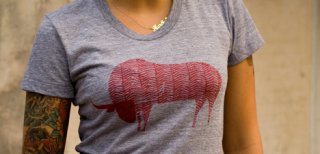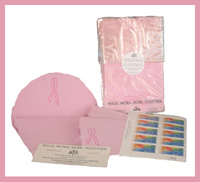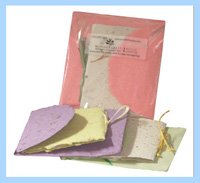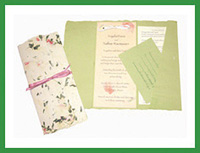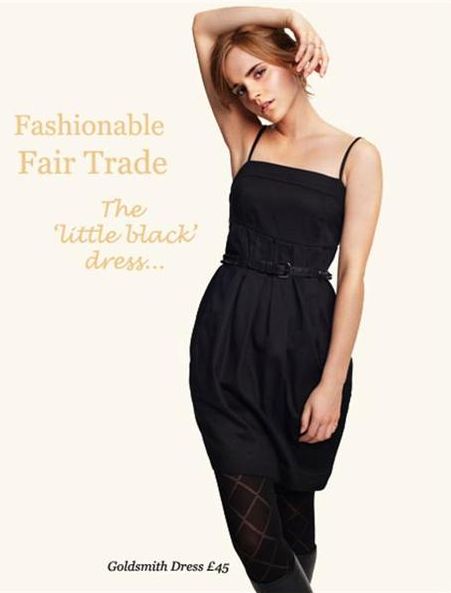Safia Minney interviews Emma Watson as they visit the women at Swallows, one of People Tree's Fair Trade partners in Bangladesh.
SAFIA MINNEY What has been your experience of Bangladesh?
EMMA WATSON I wasn't sure what to expect when we arrived in Dhaka, the capital of Bangladesh. I was expecting it to ber very busy, and hot, but the first thing that really struck me was the noise, and the traffic!
Our journey from the airpoort was unlike anything I have ever experienced: no one sticks to the lanes; everyone constantly beeps their horns and generally ignores traffic lights! Soon after arriving we visited the slums in Dhaka where the garment factory workers live.
Again, I had some preconceived ideas but nothing prepared me for the reality. It was upsetting to see the conditions in which these people live, but I was incredibly moved by their spirit and friendliness in spite of such apparent adversity.
SAFIA I guess one of the reasons why these workers in Bangladesh have been protesting for a living wage is because of their appalling living conditions in the slumns. Can you describe what facilities people have there?
EMMA Facilities? There are no facilities there to speak of. In the building we visited, I saw one shhower, one cleaning place and one hole in the floor which was the toilet. This was for the whole floor.
That floor had maybe eight or nine rooms coming off it, and each room housed a whole family, that is 32 people to one toilet.
SAFIA Their minimum wage is 1,62 taka - so that's about £6 per week. They're campaigning for around three times that much.
EMMA Even though the cost of living is much less in Bangladesh than the UK, £6 a week is appaling, especially considering the hours that they are working. They seem to work around the clock and still do not have enough money to buy food to feeed their family, or live any kind of life at all.
I really do hope that they achieve their goal of �18 a week. If they can, it would be life changing for them.
SAFIA You then went on to meet Amin Amirul, president of the national Garment Workers Federation which People Tree has been supporting for over 10 years.
EMMA It was an honour to meet Amin. Seeing his office and what he does with so little, I felt like it was him against the world. What he tries to achieve just seems so enormous.
He is so determined and he is not going to give up until the lives of the garment factory workers have been improved. He was a very compelling speaker.
SAFIA You also visited Swallows, the women's project in Thanapara, Bangladesh and one of our producers to see some of the work we are doing and to see the difference Fair Trade makes.
At Swallows we work to employ as many women as possible so that they can support their families and build a healthy community. What was it like seeing all those different processes of making clothes by hand?
EMMA I always find it difficult to impress on people what 'handmade' really means. To make a simple garment they have to produce the yarn, hand-dye the yarn, get it onto the loom, then weave the fabric, cut it to the pattern, sew it into the garment and then embroider it - all by hand.
It is so hard for people to imagine what it takes to create something and how special that item of clothing is.
SAFIA What would you say to people who are like 'we're in the 21st century so why make it by hand today - why not make it by machine?'
EMMA Having seen the slums in Dhaka and the conditions in which these people live and work to produce 'fast fashion', I would say to those people that this is not the way we should be making clothes in the modern world.
These workers have no rights and work every hour of the day just to feed their families. Fair Trade gives families the option to stay together, rather than one or both parents having to move to cities, and they are paid a fair wage. It empowers people and doesn't take away their dignity.
SAFIA Can you imagine yourself, born to a Bangladesh family and working in a garment factory?
EMMA I cannot imagine how I would have the mental ability and strength to go into the garment factories in the slums everyday and have my children living six hundred miles away.
We interviewed a woman in the slum in Dhaka. She was very candid about the fact that there just 6 wasn't any hope for her. There is no hope for anyone living in those conditions and being paid that kind of wage. Coming to Swallows I see that there is an alternative.
The living conditions are modest but it's clean and there is a real sense of community, their families are together and they seem to love and be proud of what they are doing - many things that we in the West take for granted.
Swallows is special and I need to believe for my own peace of mind that there will be more places like this in the developing countries in the world.
SAFIA People Tree does work with 50 other producer groups in Bangladesh, India, Kenya, and Peru that are making that difference. What kind of message do you want to bring to people your age now you have seen it?
EMMA I don't know how to impress upon people the importance of Fair Trade. It is so hard to get people to care and to realise what a huge difference Fair Trade can make to someone's life.
If, when buying an item, whatever it may be, people have the choice to buy Fair Trade or non Fair Trade, they should buy the Fair Trade item. It really does make all the difference - the contrast between Swallows and the slums in Dhaka is testimony to that.
SAFIA You've looked at different areas of Swallows' production, but as well as that you've seen the Swallows' day care centre for 60 children, from about 3 months to 5 years old. Then from 5 until 12 there is the school for 300 children. And it's not just for the children of the women who work here but also for children in the wider community.
EMMA It's fantastic what you've been able to do. Not only do these women have jobs, but they're earning the same amount as men - there is gender equality, they are empowered. They're able to support and look after themselves, and live in dignity.
Then there is the fact that you're running this day care centre, and also a domestic violence program for the women who are being abused at than giving to charity, I think, as you're essentially giving these people the opportunity to help themselves out of poverty and that's all they really want.
I've been given a lot in my life and I have had so many fantastic opportunities. It's really important to me that I try to give something back. I wanted to find the right thing and working with People Tree is so special and rewarding and the best way I can do that at the moment.
I really believe in Fair Trade and I just want to see more of it in the world. I need to know there are more places like Swallows.

